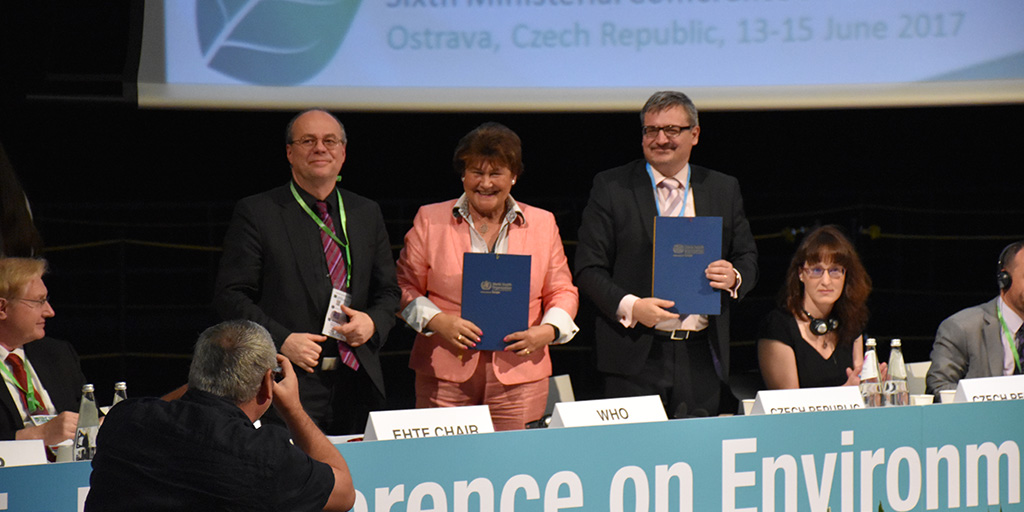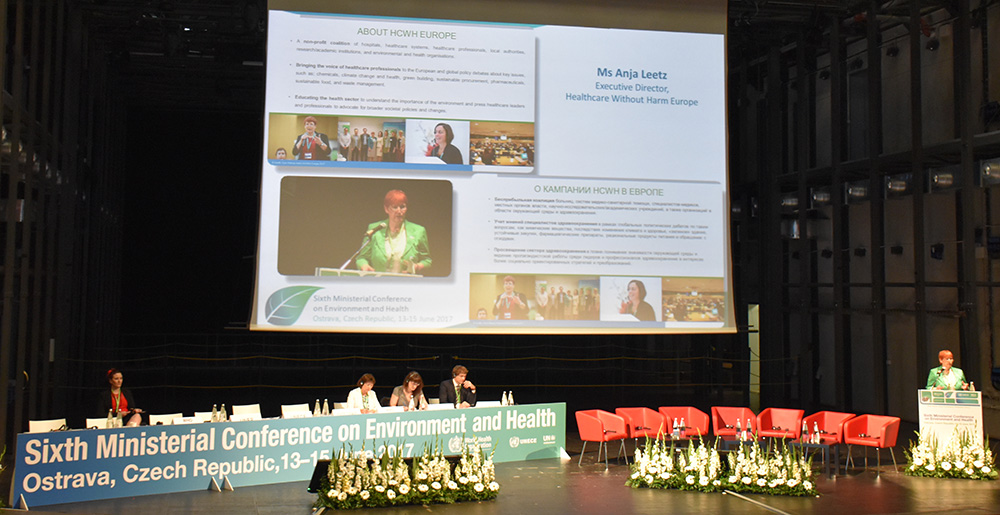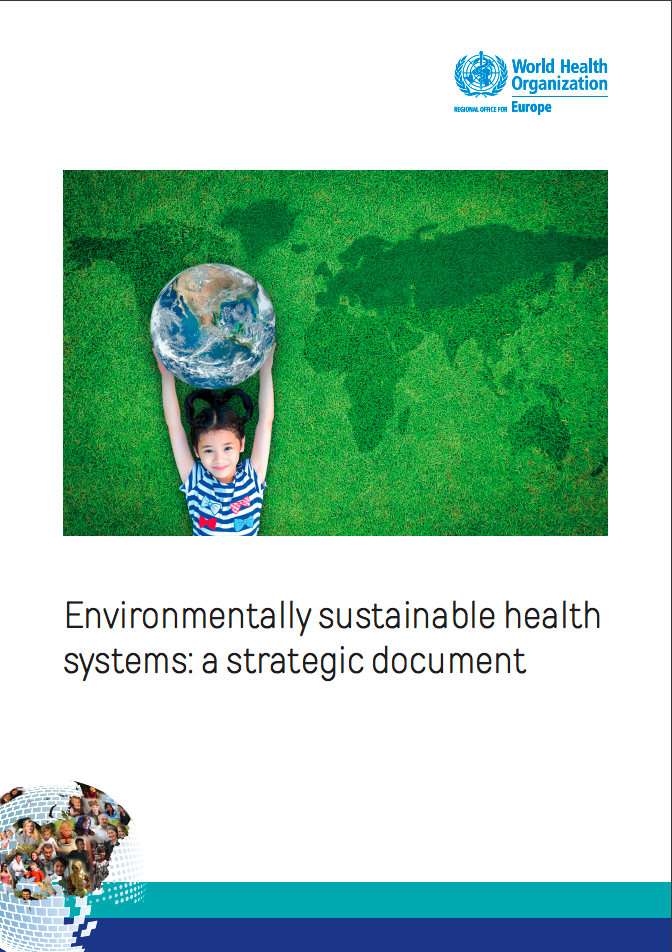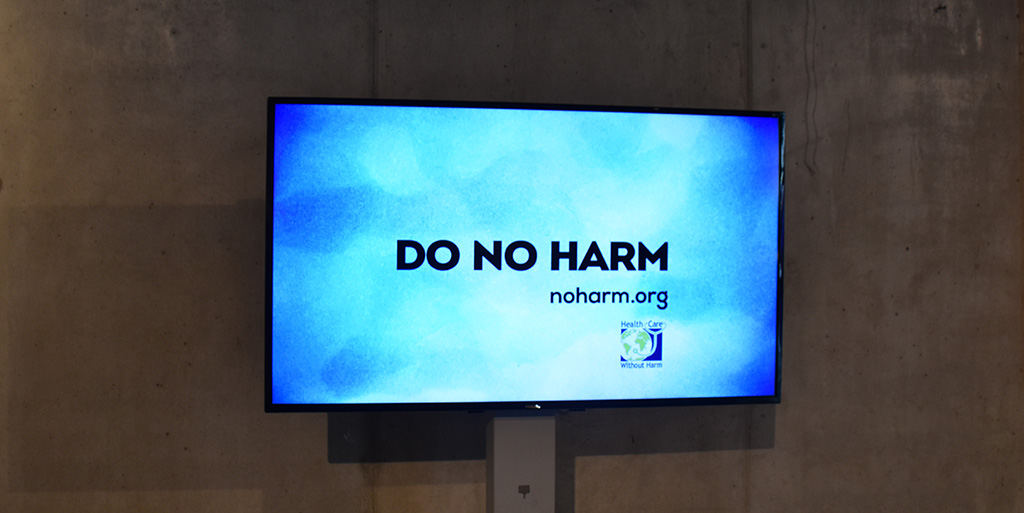Building the environmental sustainability of health systems in Europe
Between the 14th-15th of June, ministerial representatives from the 53 countries of the WHO European Region and NGOs participated in the 6th Ministerial Conference on Environment and Health. As part of the European Environment and Health Process, now running for 27 years, the ministerial conferences bring together inter-sectorial players to discuss key policy strategies, to shape and support the implementation key policies, and to forge actions on environment, health, and well-being across the WHO European Region. (WHO Europe)
Almost 1.5 million (16%) of all deaths across the WHO Euro region are due to environmental risk factors such as air pollution, poor water and sanitation services, exposure to harmful chemicals or waste, and climate change. Participants of the sixth ministerial conference gathered to discuss strategies for responding to these environmental challenges.
 At the conference, Member States adopted the Ostrava Declaration that has undergone a long process of negotiations between Member States and relevant stakeholders. The declaration includes an action plan for its implementation after 2017.
At the conference, Member States adopted the Ostrava Declaration that has undergone a long process of negotiations between Member States and relevant stakeholders. The declaration includes an action plan for its implementation after 2017.
HCWH Europe is pleased to see numerous references in the declaration affirming the need to strengthen health systems as a strategy of climate change resilience. In addition to strengthen “the public health functions of the health systems” the Declaration addresses the need to build “the environmental sustainability of health systems and reducing their environmental impact.” Furthermore, in its key action points, the Declaration states its commitment to:
“Building the environmental sustainability of health systems, and reducing their environmental impacts through such means as efficiency in the use of energy and resources, sound management of medical products and chemicals throughout their life-cycle and reduced pollution through safely managed waste and wastewater, without prejudice to the sanitary mission of health services."
The European Environment and Health Process is non-binding - it is therefore crucial for organisations and countries to turn words into action. The environment and health outcomes achieved by the 28 European Union Member States would not have been achieved only on a voluntary agreement - it would be worthwhile reflecting on what can be achieved within the WHO Euro region to reduce differences across the region and enable collaboration among countries. By understanding health creation with a “triple win approach” i.e. economic, social, and environmental benefits - countries can achieve measurable savings on health cost, whilst improving citizens’ health and creating healthier environments. It is important to note that efforts also still need to be made for the outstanding deliverables of the previous conference declaration Parma 2010 as well as implementing actions from the Ostrava declaration.
HCWH Europe in Ostrava
This “greening the health sector” approach has long been advocated by Health Care Without Harm (HCWH) Europe - it is an important step in recognising the contributions the health sector can bring in the fight against climate change. (Learn more from this case study: Transitioning to environmentally sustainable health systems: The example of the NHS in England).
As well as applauding the inclusion of this vital action, representatives of HCWH Europe attended the conference to observe and participate in the plenary panel sessions and side events, bringing the voice of health professionals to the debate. HCWH Europe team members were also present in the exhibition space, on hand to provide information about the organisation, members, and projects.
 Opening the final plenary on Thursday 14th June, HCWH Europe Executive Director Anja Leetz reiterated the impact of air pollution on health - a sentiment expressed by many other speakers throughout the conference, referencing the European health sector’s efforts to reduce emissions (Read more: Reducing healthcare’s climate footprint). Ms. Leetz also emphasised the need to reduce chemical exposure, especially for vulnerable populations, specifically from chemicals historically and currently used in healthcare such as mercury and endocrine disrupting chemicals found in medical devices. Ms. Leetz closed her keynote speech stating that health policies should be evaluated on costs and benefits - and such benefits need to include the currently overlooked aspect of mortality reduction.
Opening the final plenary on Thursday 14th June, HCWH Europe Executive Director Anja Leetz reiterated the impact of air pollution on health - a sentiment expressed by many other speakers throughout the conference, referencing the European health sector’s efforts to reduce emissions (Read more: Reducing healthcare’s climate footprint). Ms. Leetz also emphasised the need to reduce chemical exposure, especially for vulnerable populations, specifically from chemicals historically and currently used in healthcare such as mercury and endocrine disrupting chemicals found in medical devices. Ms. Leetz closed her keynote speech stating that health policies should be evaluated on costs and benefits - and such benefits need to include the currently overlooked aspect of mortality reduction.

The second day of the conference also saw HCWH Europe partnered with WHO Europe for a side event Towards environmentally sustainable health systems: Harnessing the benefits of sustainability for better health. Alongside Anja Leetz, speakers included Dr Hans Kluge of WHO Europe, Rosemary Kumwenda of the UNDP, and Dr Graham Bickler, Programme Director of Public Health England. As part of this side event WHO Europe launched their new publication Environmentally sustainable health systems: a strategic document.
During the three-day conference, The Gallery of Solutions provided a multimedia space for a variety of contributors to present on the thematic areas included in the actions of the Ostrava declaration. Posters and short videos were on display covering topics such as water quality and sanitation, waste disposal, and sustainable health systems. HCWH Europe’s recent Safer Pharma campaign was one such video, explaining the growing issue of pharmaceuticals in the environment.
The short film: Do No Harm was also shown, telling story of Health Care Without Harm’s founding 20 years ago, and the continuing mission of transforming healthcare to reduce its environmental footprint. The 10 goals of Health Care Without Harm: leadership, chemicals, waste, energy, water, transportation, food, pharmaceuticals, buildings and purchasing - and their implementation, are described in HCWH’s Global Green and Healthy Hospitals programme.
HCWH Europe welcomes the signing of the Ostrava Declaration, and urges all governments of the WHO Euro Region to advance their efforts to implement the action points addressed in the Declaration, to significantly reduce environmental health risks in their respective countries and across the region. HCWH Europe stands ready to work with countries, regions and health systems to implement the declaration.

